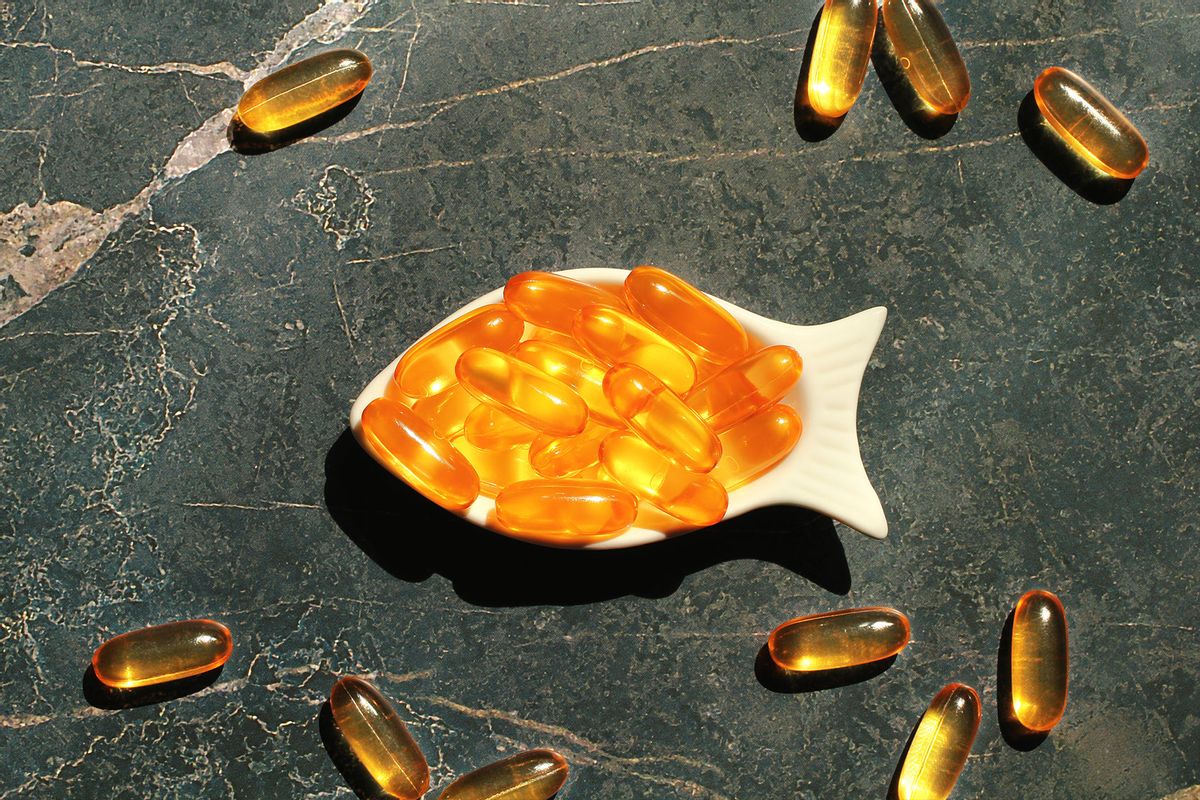I took the first shot almost as a dare. The breakfast buffet at our hotel in Iceland had been laden with extraordinary delights — smoked fish, homemade bread, the most outstanding butter — and right there at the front of the line, a big bottle of cod liver oil and a row of neatly lined up shot glasses. Assuming a casual "when in Reykjavik" attitude, I knocked one back. The flavor was exactly as unpleasant as I assumed it would be — and I've been drinking it every morning since. As strange as it sounds, I've come to believe that downing an ounce of something that tastes like cat food smells every day somehow makes me happier.
We know that what we eat affects our bodies, but the connection between food and the mind is often overlooked. And as an already sleep deprived, anxiety attack-prone person facing the darkest, dreariest season of the year, I figured it was worth a shot to try to nourish my way to a better attitude. The evidence is encouraging. "Research has shown that a diet rich in omega-3 fatty acids can help to reduce depression rates," says registered dietician Alyssa Pacheco. Pacheco notes that "Salmon, sardines, herring, chia seeds, flaxseeds, and walnuts are some great sources of omega-3 fatty acids." And cod liver oil, an old-fashioned staple of Scandinavian culture that deserves a renaissance here.
What is it about omega-3's? Celebrities like Gwyneth Paltrow are fans, but their apparent anti-inflammatory, serotonin boosting properties are still being debated. A 2020 study out of England concluded that "Omega-3 intake does not prevent depression or anxiety," but a 2018 JAMA review found the fatty acids may be helpful in alleviating existing symptoms.
Other foods seem to have an impact on mood in different ways.
"Research shows that probiotics can have a small but significant impact on improving depression rates," Pacheco says. "There's exciting and emerging research coming out in recent years showing just how important a healthy gut microbiome is. Ideally, we want to strive for having a diverse gut microbiome — or a variety of different, beneficial bacteria in our digestive tract. Fermented foods such as Greek yogurt, kefir, kimchi, sauerkraut, kombucha, and tempeh can also provide your body with these beneficial gut bacteria."
And while healthy classics like fish and yogurt are ... fine, I love that my favorite indulgence is also a mood booster. "Dark chocolate stimulates the production of endorphins, chemicals in the brain that create feelings of pleasure," says Paul Daidone, Medical Director at True Self Recovery. "It also contains phenylethylamine, which can act as a mood elevator."
We need your help to stay independent
Just as food can lift the spirits, it appears it can also bring them down. The relatively new field of nutritional psychiatry is opening up the exploration into the ways in which diet and nutrition play a part in mental health. That connection can be particularly keen during comfort food season. As my colleague Michael La Corte reported recently, research in the journal Frontiers in Nutrition and Nutrients found that subjects who ate high fat, high carb croissants in the morning had a "significant difference in how their bodies recover from stress" over a control group. The study authors recommended "nibbling on fruits and vegetables instead," an admittedly tall order on the days when I feel like climbing inside of a tray of eggplant parm.
"During the colder months, people often crave carbohydrates and may overindulge in comfort foods," notes Dr. Daidone. "While this might provide temporary relief, it can lead to a cycle of mood swings as blood sugar levels spike and crash. A balanced diet that includes plenty of fruits, vegetables, lean protein, and whole grains can help keep your mood stable." He also recommends filling up on complex carbs. "Foods like pumpkin seeds, apples, chickpeas,
strawberries, and oatmeal are complex carbs that can increase the production of serotonin, often referred to as the feel-good hormone."
But it's also not just what you eat, but how often and how much that counts. As a certifiably hangry type, I know that my outlook on life gets bleaker when my blood sugar dips. Eating regular meals with sufficient portions — and keeping a granola bar or two in my bag for emergencies — keeps me a more solid footing for whatever else the day brings.
My daily spoonful of omega-3 rich cod liver oil, which has the added mood elevating oomph of vitamins A and D, is definitely an acquired taste. But the body seems to absorb nutrients better this way than in capsule form, and I don't have to guess my way through the confusing barrage of pills in my local vitamin aisle.
Alyssa Pacheco says, "While supplements may be helpful, food is always the best option for getting healthy fat sources into your diet. Food sources of omega 3 fatty acids will also contain other beneficial nutrients such as protein, fiber, vitamins, and minerals." Similarly, she says, "Although probiotic supplements show promise for being part of a treatment approach for depression, it's also a good idea to optimize your gut health through foods too."
I wish I could say that I now just throw a few chia seeds at my problems and all my depression and anxiety have magically melted away. Hahahahah no. But adding more probiotics and omega-3 's in my diet and restricting my caffeine and alcohol consumption — along with working out, getting outside in nature, prioritizing my sleep and reaching out to friends — really have made a difference in just a few weeks. I still like French fries and red wine, always will, but I can't ignore the subtle shifts in my mental health lately. Just like the Tin Man, it turns out I just needed a little oil to loosen myself up.
Read more
about the nutrition and mental health connection



Shares